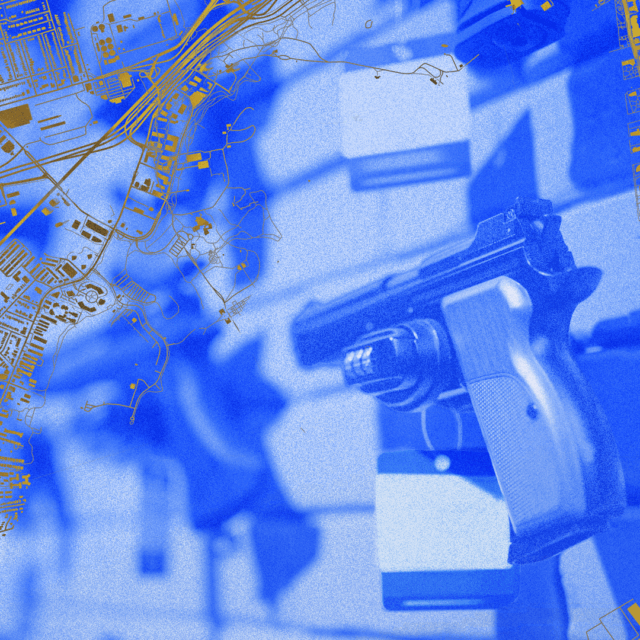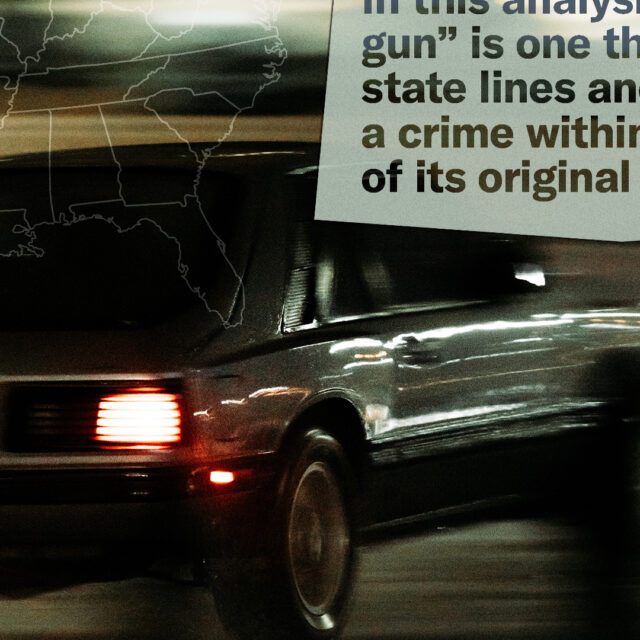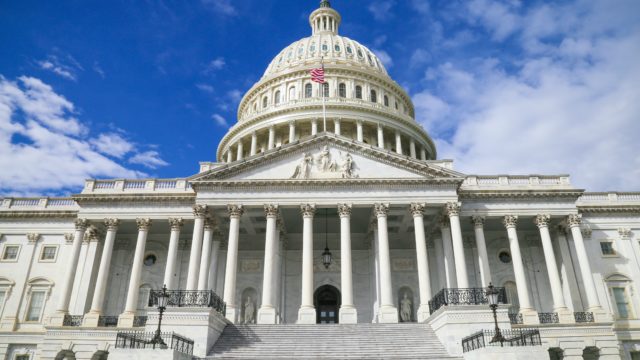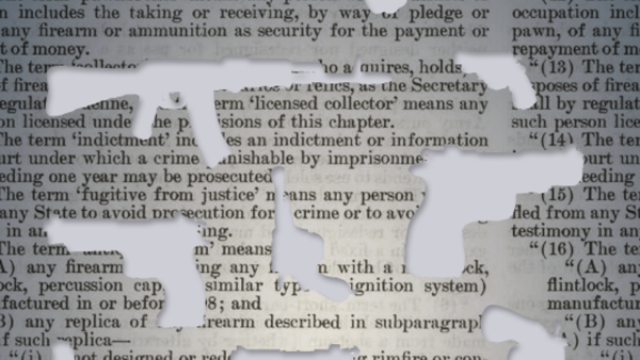Repeal Restrictions on Gun Trace Data
Repeal Restrictions on Gun Trace Data
What does this solve?
First enacted by Congress in 2003 as a rider to an appropriations bill, the Tiahrt Rider has restricted public access to data about gun crime and firearm trafficking.
Which states require crime guns to be traced?
14 states have adopted this policy
Crime Gun Tracing
Alabama has not adopted this policy
Crime Gun Tracing
Alaska has not adopted this policy
Crime Gun Tracing
Arizona has not adopted this policy
Crime Gun Tracing
Arkansas has not adopted this policy
Crime Gun Tracing
California has adopted this policy
Crime Gun Tracing
Colorado has not adopted this policy
Crime Gun Tracing
Connecticut has adopted this policy
Crime Gun Tracing
Delaware has adopted this policy
Crime Gun Tracing
Florida has not adopted this policy
Crime Gun Tracing
Georgia has not adopted this policy
Crime Gun Tracing
Hawaii has not adopted this policy
Crime Gun Tracing
Idaho has not adopted this policy
Crime Gun Tracing
Illinois has adopted this policy
Crime Gun Tracing
Indiana has not adopted this policy
Crime Gun Tracing
Iowa has not adopted this policy
Crime Gun Tracing
Kansas has not adopted this policy
Crime Gun Tracing
Kentucky has not adopted this policy
Crime Gun Tracing
Louisiana has not adopted this policy
Crime Gun Tracing
Maine has not adopted this policy
Crime Gun Tracing
Maryland has adopted this policy
Crime Gun Tracing
Massachusetts has adopted this policy
Crime Gun Tracing
Michigan has not adopted this policy
Crime Gun Tracing
Minnesota has adopted this policy
Crime Gun Tracing
Mississippi has not adopted this policy
Crime Gun Tracing
Missouri has not adopted this policy
Crime Gun Tracing
Montana has not adopted this policy
Crime Gun Tracing
Nebraska has not adopted this policy
Crime Gun Tracing
Nevada has not adopted this policy
Crime Gun Tracing
New Hampshire has not adopted this policy
Crime Gun Tracing
New Jersey has adopted this policy
Crime Gun Tracing
New Mexico has not adopted this policy
Crime Gun Tracing
New York has adopted this policy
Crime Gun Tracing
North Carolina has adopted this policy
Crime Gun Tracing
North Dakota has not adopted this policy
Crime Gun Tracing
Ohio has not adopted this policy
Crime Gun Tracing
Oklahoma has not adopted this policy
Crime Gun Tracing
Oregon has adopted this policy
Crime Gun Tracing
Pennsylvania has adopted this policy
Crime Gun Tracing
Rhode Island has adopted this policy
Crime Gun Tracing
South Carolina has not adopted this policy
Crime Gun Tracing
South Dakota has not adopted this policy
Crime Gun Tracing
Tennessee has not adopted this policy
Crime Gun Tracing
Texas has not adopted this policy
Crime Gun Tracing
Utah has not adopted this policy
Crime Gun Tracing
Vermont has not adopted this policy
Crime Gun Tracing
Virginia has adopted this policy
Crime Gun Tracing
Washington has not adopted this policy
Crime Gun Tracing
West Virginia has not adopted this policy
Crime Gun Tracing
Wisconsin has not adopted this policy
Crime Gun Tracing
Wyoming has not adopted this policy
How it Works
Repealing the 2012 Tiahrt Rider would aid both the public in understanding where crime guns in their communities come from and policymakers in crafting targeted solutions to gun crime.
Crime gun tracing is a critical data source—it can help solve gun crimes, and it can also help identify where the guns used in crimes are originating from and wider trends in gun trafficking. But since 2003, annual riders attached to U.S. Department of Justice appropriation bills have prohibited ATF’s use of appropriated funds to disclose most of this important data with the public. This Rider is known as the Tiahrt Rider or the Tiahrt Amendment—named for Representative Todd Tiahrt who first introduced the Rider. At the time of its passage, Rep. Tiahrt was quoted saying, “I wanted to make sure I was fulfilling the needs of my friends who are firearms dealers. NRA officials were helpful in making sure I had my bases covered.” This data-blocking measure serves to protect corrupt dealers and hinder policymakers.
Congress enacted the current and only operative version of the Tiahrt Rider in 2012. The 2012 Tiahrt Rider exempts from the general funding limitation disclosures to federal, local, and foreign law enforcement or intelligence. It also includes language, explaining that the Rider should not be construed to prevent: (A) disclosing statistical information related to the production of licensed importers or manufacturers; (B) the exchange of information among law enforcement officials; and (C) publishing annual statistical reports on ATF regulated products and statistical aggregate data on firearms trafficking and misuse.
By the numbers
1.27M
By the end of 2026, an estimated 1.27 million guns will have been illegally trafficked since 2017.
$695M
Trafficked firearms are big business. Everytown estimates that between 2017 and 2023, gun dealers earned approximately $695 million from sales of trafficked firearms.
88M
An estimated 88 million guns were sold in the United States from 2020 to 2024—a 24 percent increase compared to the previous five years.
Featured Resources

The Supply Side of Violence: How Gun Dealers Fuel Firearm Trafficking
Examining the scale of firearm trafficking in the U.S., how gun dealers fuel it, and a roadmap for state action to help protect communities.

Who is Manufacturing the Guns Used in Crimes?
The same manufacturers who are engaging in risky business practices to profit the most from gun sales are also behind the most gun crimes.

Five Things to Know About Crime Guns, Gun Trafficking, and Background Checks
The current patchwork of state laws makes it easy for individuals to traffic firearms from states with weaker gun laws.

Damming the Iron River
All Resources
Repeal Restrictions on Gun Trace Data
All Resources
Appendix 1: Understanding Crime Gun Tracing to Prevent Gun Violence
How are firearms traced? Crime gun tracing is an important tool for law enforcement to trace the lawful chain of custody of a firearm in…
AppendixNew Mexico Firearms Trafficking and Crime Gun Fact Sheet
New Mexico is facing a crime gun crisis—and the evidence points squarely at the state’s own federally licensed gun dealers.
Fact SheetWisconsin Firearms Trafficking and Crime Gun Fact Sheet
Wisconsin is facing a crime gun crisis—and the evidence points squarely at the state’s own federally licensed gun dealers.
Fact SheetMichigan Firearms Trafficking and Crime Gun Fact Sheet
Michigan is facing a crime gun crisis—and the evidence points squarely at the state’s own federally licensed gun dealers.
Fact SheetLocal Gun Violence Dashboards
Everytown's toolkit outlines 10 steps to launching and effectively using a local gun violence dashboard, and the benefits of doing so.
Data Tool
Update Background Check Laws
Updating federal and state laws to require background checks on all gun sales is a common-sense way to keep guns out of the wrong hands.
Fact Sheet
Five Ways to Enhance the Gun Violence Prevention Strategy in Your City
Cities that have sustained success preventing gun violence have deployed multi-disciplinary, community-involved approaches to response and prevention. Below are five steps that you can take…
Fact SheetBusiness As Usual
Americans suffer from an extraordinary rate of gun violence, 20 times higher than nations with comparable levels of economic development.1…
Report

